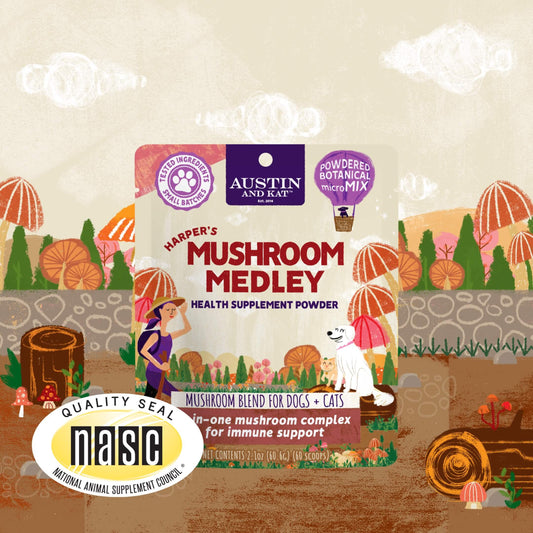Mushrooms for Dogs

we ♡ mushrooms
a brief guide to mushrooms for dogs
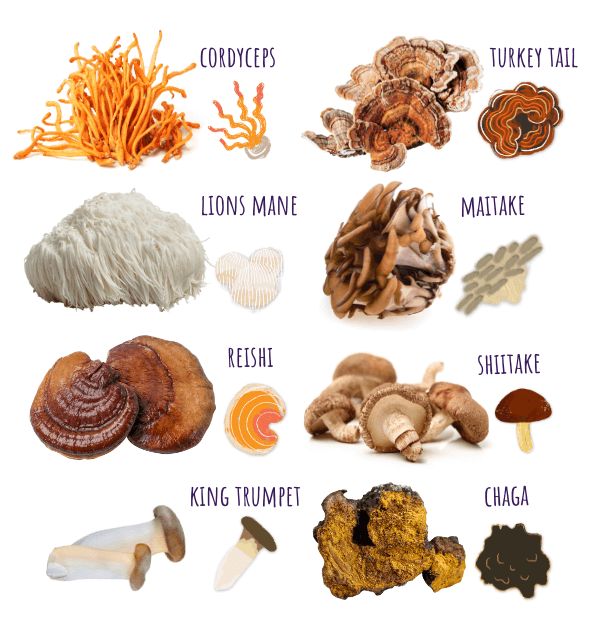
Mushroom supplements have recently been uncovered as one of the most effective ways to maintain long term cognitive and immune health in both people and dogs. My family and I started taking mushroom extracts for our personal health about 8 years ago after attending a talk on the complex active compounds found in fungi. What was most interesting was that mushrooms help dogs in the same way they help people, so if you’ve ever wondered what exactly makes them so effective (and why) then this guide is for you.
Mushrooms are the most fascinating and exotic forms of life on the planet and they’re really shaking up the world of companion animal health. From freeze-dried powders to powerful liquid extracts, the complex active compounds found in fungi provide tremendous support for your dog’s immune system. But what makes them so important to overall health and how (and why) do they work? Well we’ve been fungi fanatics for a long time and we’re excited to share some amazing facts about the science behind their benefits.
Mycellium or Mushroom? Mushroom or Fungi?
First…let’s get some basics out of the way…
Fungi inhabit their own kingdom, which means they aren’t plants or animals, but have similarities to both. They breathe oxygen, just like us, but seem more like plants with the exception that they don’t generate food from sunlight (photosynthesis).
A fungus always has a mycelium network that is typically made up of threadlike cells often found within soil or decaying plant material (like rotting wood). Mycelium are like roots in some ways, as they collect and store nutrients they extract from the surrounding soil.
In contrast, a mushroom is a fruiting part of a fungus that grows on or near ground level. Like a fruit, its job is to disperse seeds (spores) and these mushrooms come in all shapes, sizes, and colors, and form beautiful but delicate structures that seemingly appear out of nowhere and then vanish a few days later.
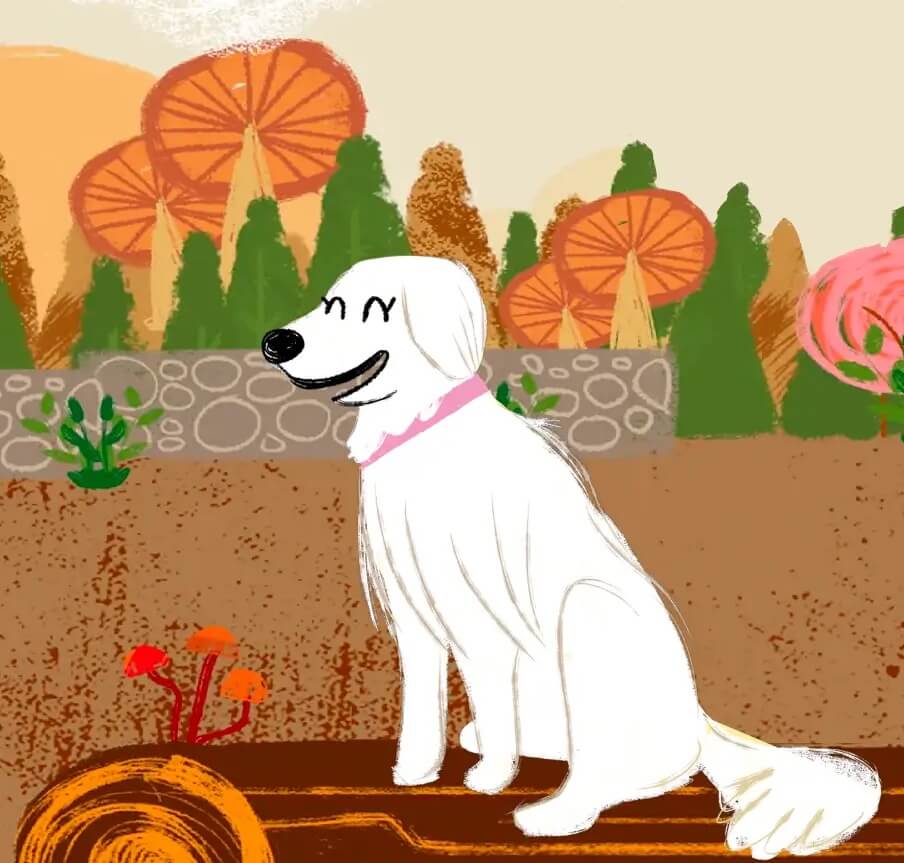
So while mushrooms can appear quickly and unexpectedly, the mycelium lurks beneath the surface of the ground, developing slowly over time. And since it’s mostly hidden from view, this mycelium can grow to be huge.
The largest living organism on the planet is a two thousand year old honey mushroom nicknamed the Humongous Fungus. It’s actually a single fungus that’s three and half miles wide, and its yellowish mushroom caps pop up around the bases of trees all over the Malheur National Forest in Oregon.
Unlike plant roots though, the mycelium network can synthesize and transport complex encoded messages within a fungus, to neighboring fungal networks, and even to trees. It’s this communication system that helps fungi collaborate and adapt to changing conditions in their environment. Scientists have discovered that this also happens to be the inspiring force behind the active compounds that benefit pets.
To keep things simple, from here on when we say mushroom, we really mean the whole thing, but the most important part for us is the fruiting body that we all recognize. OK - let’s go.
the perfect selection of mushrooms that benefit dogs & cats
Mushrooms effect the body in different ways, each mediating a unique collection of systemic benefits to pets through the immune system. The right combination can make all the difference in a pet's long-term health and quality of life. Check out some highlights from our favorites below:
Collapsible content

REISHI + hip and joint mobility
reishi mushrooms for dogs & cats
We love reishi mushroom and it makes a special showing in several of our formulas supporting aging and joint mobility. Reishi have around 400 different biologically active constituents including complex polysaccharides and tri-terpenoids, and collectively they offer incredible support for occasional stiffness and soreness through their ability to improve immune system function. What’s the connection between immunity and joint mobility? Reishi mushrooms help normalize the immune system’s inflammatory response, which is a key factor in reducing runaway free radical damage that accompany aging joints (learn more in our upcoming section, Helping Hips & Joints).
reishi mushroom in the wild
Where do they grow? Reishi mushrooms (Ganoderma lucidum) can be found in habitats including tropical and temperate forests, localized mostly to Europe, Asia, South America, and North America (like right here in the PNW!). They typically pop up in moist and shady areas, such as forests and alongside rivers, mostly on the trunks and branches of trees. They can be identified by their dark purple gills and white spores.
TURKEY TAIL + genome integrity
turkey tail mushrooms for dogs & cats
Turkey tail mushroom is one of the most popular fungi in the pet industry today and a real special ingredient among medicinal mushrooms for the immune system. Packed with complex polysaccharides, turkey tail mushrooms help dogs maintain healthy DNA and the integrity of their genome. Turkey tail mushrooms work their magic with compounds like polysaccharopeptide (PSP) that can upregulate DNA maintenance and communicate with white blood cells in the immune system. Overall, turkey tail mushrooms are a powerful tool for protecting DNA from external stressors while strengthening overall health.
turkey tail mushrooms in the wild
The scientific name for turkey tail mushroom is Trametes versicolor and they are a type of bracket fungus. They typically grow on the trunks and branches of trees, but turkey tail mushroom can also be found on the ground in moist enough areas.
Turkey tail mushroom has many overlapping layers that resemble the fanned feathers of turkeys and other poultry. The caps are fan-shaped and range in color from light brown to dark brown. The gills are white and have a spore print that is whitish to pale yellow.
LION’S MANE + cognitive balance
lion’s mane mushroom for dogs & cats
Lion's mane mushrooms are our chosen superstar for seniors, as they contain a powerful antioxidant called hericenone B that has been found to promote healthy brain function in dogs. Studies have shown that lion's mane mushroom supplements can help dogs maintain memory recall, making them an excellent supplement for older dogs who are experiencing occasional stress from changes in cognitive balance. By promoting normal neurological function, lion's mane mushrooms can be the perfect partner for aging pet care.
lion’s mane mushroom in the wild
Lion’s mane mushrooms are found throughout the world in both tropical and temperate forests. They prefer to grow on hardwood trees, although they can also be found on conifers. These mushrooms get their name from their characteristic long, flowing "mane" of white spores that trails from the top of the cap.
CORDYCEPS + liver detoxification
cordyceps mushrooms for dogs & cats
Cordyceps mushrooms are an amazing ingredient for immune support that helps protect normal liver function and detoxification. Its active secondary metabolites like Cordycepin help reduce inflammation associated with daily exercise and stress, giving your dog a leg up on long-term homeostasis.
cordyceps mushroom in the wild
The habitat of cordyceps mushrooms (e.g., Cordyceps militaris) is in moist, warm environments such as soil, dung, and rotting wood. They can often be found in mountainous areas and can grow on the bodies of insects and other invertebrates. They prefer a humid climate and can be found in areas that receive a lot of rainfall.
CHAGA + allergy support
chaga mushrooms for dogs & cats
Chaga mushrooms are great for allergies and skin health because it helps dogs maintain a normal cytokine cascade associated with the immune system and allergy response. Dogs with seasonal allergies from tree and grass pollens will certainly welcome this type of support! Find it among other immune-allergy superstars in our Mushroom Medley topper.
chaga mushroom in the wild
Chaga mushrooms are found on birch trees, and they grow in cold climates in North America, Europe, and Asia. They prefer moist, shaded areas with well-drained soil.
SHIITAKE + pathogen resistance
shiitake mushrooms for dogs & cats
Shiitake mushrooms are a great choice that you can find in our Mushroom Medley dog food topper designed to support immune system function. Chock-full of antioxidant beta-glucans like lentinan, shiitake helps our canine friends maintain the integrity of DNA for a normal immune response
shiitake mushroom in the wild
Typically found in hardwood forests in shaded areas on the stumps of trees, Shiitake mushrooms grow on deadwood from oak, chestnut, and beach. In addition to North America, shiitake mushrooms are also found in Asia, Europe, and South America. Popular as both cooking mushrooms and medicinal mushroom supplements, the shiitake has a recognizable tan cap and cream gills on the underside.
MAITAKE + metabolic upkeep
maitake mushrooms for dogs & cats
Maitake mushrooms are an awesome cat-safe mushroom supplement featured in our Purrfect Feline Formula topper. They are a perfectly versatile ingredient that provides daily support for cats from its positive impact on energy production and metabolism (especially related to the immune system and regulating blood pressure). Proper body weight management You can also find these beautiful mushrooms for dogs in our Mushroom Medley topper.
maitake mushroom in the wild
Maitake mushrooms make a habitat out of deciduous and coniferous forests, typically in the hardwood forests of North America and Asia. They grow in late summer and fall in areas away from the sun. Maitake mushroom translates to "dancing mushroom" and they were named because of their clusters that resemble a bunch of grapes.
KING TRUMPET + calming nerves
king trumpet mushrooms for dogs & cats
King trumpets is an awesome mushroom making a splash in supplements supporting occasional stress relief (and a great complement to botanicals like Ashwagandha in our No More Wiggles topper.). It naturally produces L-ergothioneine, which has a number of beneficial effects on the nervous system. Studies have shown trumpet mushrooms ingested regularly led to a reduction in stress and anxiety and a more balanced demeanor. Overall, as an easily accessible and naturally occurring source of nutrients for the nervous system, mushrooms such as king trumpet can be an excellent tool for promoting mental health and wellbeing.
king trumpet mushroom in the wild
The king trumpet typically grows in the wild on rotting hardwood logs or stumps in dark and moist environments throughout Europe, North America, and Asia. King trumpets have a thick white stalk and a large, creamy-white cap that can reach up to a foot in diameter. Their pinkish gills run down the length of the stalk, and its spores are dark black.
diving into the basics
Are there different health benefits or medicinal properties associated with mycelium compared to fruit bodies (mushrooms)?
When most people hear medicinal mushrooms they think of a big stalk of turkey tail or reishi, but as we learned above the life cycle of mushrooms is much more complex than just the fruits that we are familiar with. While the fruit body contains a much higher concentration of secondary metabolites compared to the mycelium, the mycelium synthesizes its own set of beneficial antioxidant compounds that are great for people and pets.
While any product should be a majority fruit body, including some mycelium and the complementary compounds inside definitely has a positive impact (especially in a food topper when you are looking for the benefits of macromolecule compounds like beta-glucans). The important distinction to make when thinking about this question is that the mycelium grows upon a meshwork of its food of choice (e.g., wood, rice, or grain), but slowly converts that food into more mycelium over time.
With that in mind, if a fungiculturist decides to include too much of this mycelium and harvest it too early, they are risking (or purposefully allowing) the addition of lots of bulking material that does not include much benefit. This is where standardized powders and extracts and trustworthy supply chains make all the difference. If every lot of ingredients must be tested and hit marks on an accepted set of compounds unique to mushroom fruit bodies, there is no way to include this bulking agent that leads to an inferior product (Learn more about testing and safety in our dedicated section).
What’s the difference between wild mushrooms and cultivated ones?
Wild mushrooms grow in open natural environments subject to predation and competition from neighboring fungi. Cultivated mushrooms are grown in controlled environments using a strain of spores that is maintained and analyzed over time. Cultivation offers proper control of substrates (the ‘soil’ that mycelium grows and feeds upon’) and modern farming techniques that drive a consistent extraction of different natural compounds.
Considering the speed at which mushrooms adapt to their environments and the potential for new toxic compounds, you should never feed your dog a random wild mushroom you find in nature due to unknown mushroom toxicity.
What’s the difference between powdered and liquid supplements?
Powdered mushroom supplements are focused on delivering a larger quantity of macromolecule compounds like beta-glucan, a naturally occurring membrane-bound molecule found in the cell walls of fungi.
Interestingly, plants and bacteria make beta-glucans as well, but the structure and function of beta-glucans from mushrooms have an entirely different effect on animal immune systems. They offer great benefits for pets and are easily eaten in large quantities using food toppers.
Liquid mushroom extracts are much more focused on delivering specific antioxidants and secondary metabolites that are more stable and bioavailable in a liquid-based extract.
We include these in several of our functional CBD oils and they add a totally different series of benefits compared to their powdered versions.
How long have humans and pets been using mushrooms? Are they safe?
Mushrooms are totally safe and have been extensively studied in mammals including dogs and cats (especially the 8 mushrooms we've chosen for use in our products).
Traditional Chinese practitioners of plant and fungi- based supplements have incorporated the same techniques to dry and prepare mushrooms for thousands of years.
The benefits for dogs listed above have been extensively researched and mushrooms are slowly but surely taking over the conversation in serious research settings. Outside of the risks associated with picking wild mushrooms, all of these ingredients are commonly used and generally recognized as safe.
Can dogs eat mushrooms of all types, raw or cooked?
No! Many medicinal mushrooms can be found in the supermarket but that doesn’t mean they’re ready to eat. Dogs eat mushrooms of many different types but they can’t eat a lot of mushrooms raw as they are difficult to digest and can have toxic effects.
While there are a few common store bought mushrooms that can be cooked and added to your dog’s diet, the safest way to introduce mushrooms is by supplementing your pet’s diet with a high quality mushroom supplement.
Many medicinal mushrooms should be used cautiously in pets with bleeding disorders, chronic low blood pressure, liver disease, kidney disease, or severe immune-mediated disorders. Have a chat with your vet before starting if your dog has any pre-existing health issues.
What’s the difference between fresh mushrooms and dried mushrooms?
When you buy mushrooms from the produce section they are generally raw mushrooms that have not yet lost any of their medicinal properties. What’s the difference between those and the ones in a supplement, and what makes some versions of mushrooms good for supplements and others not?
Outside of the risk to digestive health if dogs eat raw mushrooms, it’s really all about water content. When fresh, mushrooms are still incredibly moist. You sure would have to eat a lot of them to get the benefits (i.e., you must be taking in quite a bit of extra food relative to your body weight)! The better option is to start with dried mushrooms that have lost their water weight (this is your basic mushroom powder, which is sometimes concentrated further).
Even concentrated liquid extracts start with dried mushrooms, as it makes it easier to get the ratio of extraction solvents to fungi material you’re looking for. In short, dried mushrooms are the preferable choice for supplements from medicinal mushrooms.
For pet owners, cooked mushrooms can still offer complex carbohydrates and amino acids that lower cholesterol and offer support against liver problems and liver disease, but when looking for real benefits from mushrooms for dogs you need to turn to a supplement.
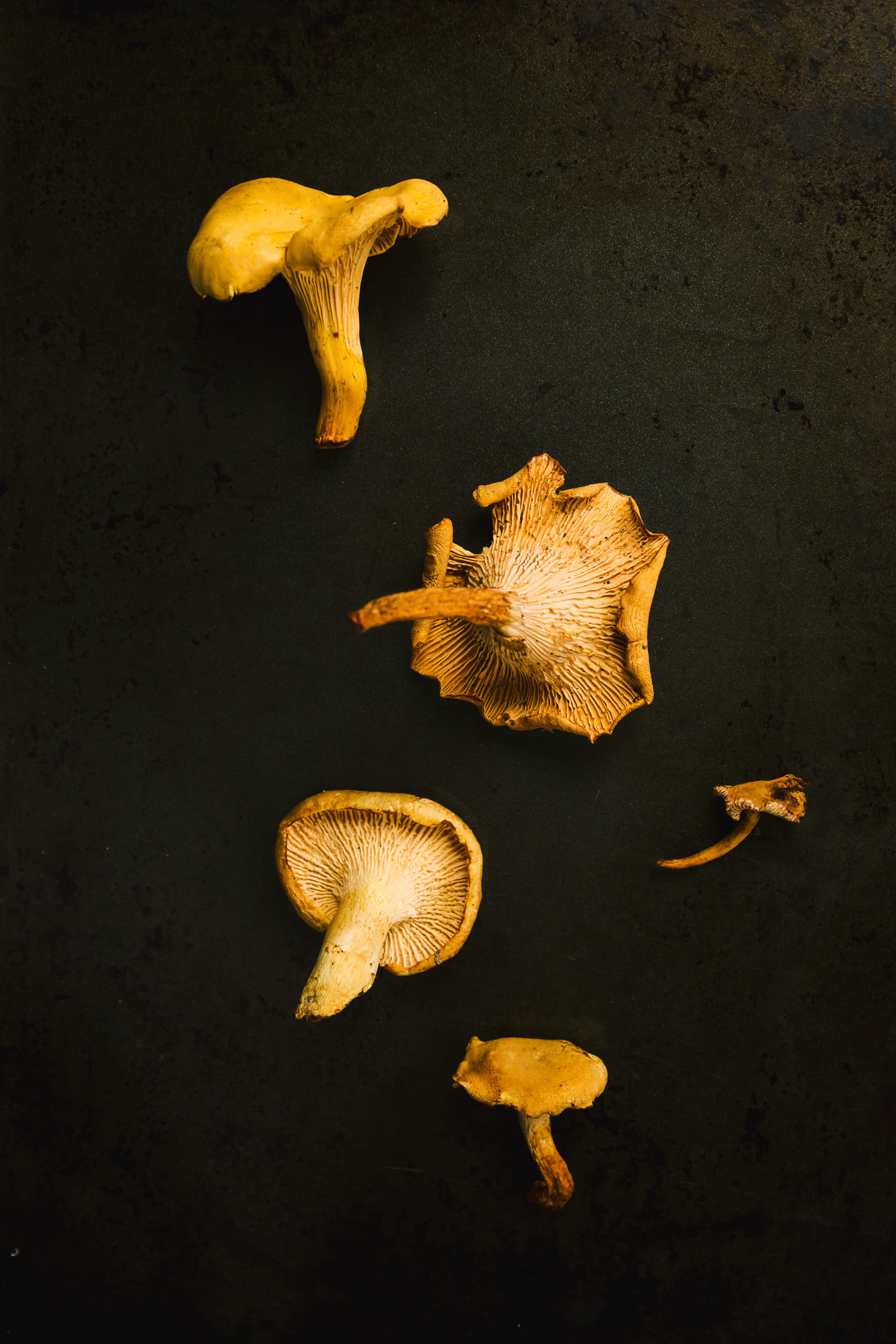
Anyone for beta-glucans and secondary metabolites?
Our packaging calls out the “powerful tri-terpenes”, “polysaccharides”, and “high beta-glucans” so if you go no further just know this…all of those are good for you and your pet - they're known as secondary metabolites.
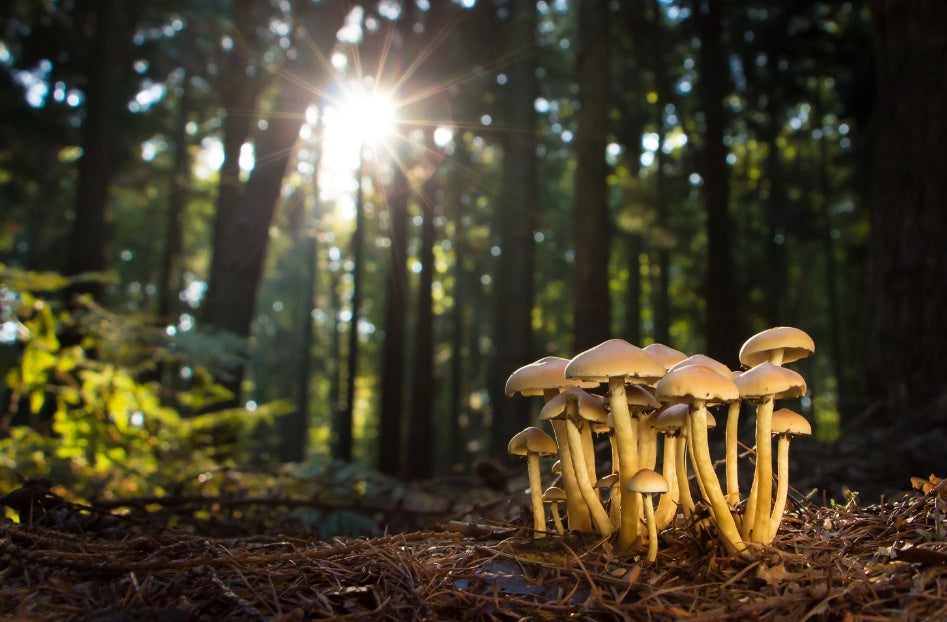
Mushrooms are able to adapt their defenses and control their surroundings with secondary metabolites, giving them a unique evolutionary history. They are some of the only living organisms that purposefully string together carbohydrates and amino acids into these specialized chemical messengers. The rapid ability to create and test new secondary metabolite signaling molecules gives mushrooms agency over their environment, so much so that they’ve evolved as shepherds and stewards of entire ecosystems.
For instance, these chemical compounds play an important role in the survival and health of plants. In fact, as part of a mutually beneficial relationship, mushrooms produce secondary metabolites that help plants to thrive and survive. These unique compounds aid in everything from immune response and stress management to cellular repair and growth.
Additionally, mushrooms can help to buffer against environmental stresses like drought or heatwaves, improving plant resilience and giving them an edge over their competitors. Ultimately, these diverse roles make mushrooms an essential part of healthy plant communities, helping them to overcome the many challenges that come their way.
This same evolutionary process has been incredibly beneficial for imparting powerful compounds into medicinal mushroom supplements. Each species of fungi has developed its own profile of active compounds over time, creating a unique set of health benefits for every different mushroom supplement.

dark, cool, and humid? we've got it all in the Pacific Northwest!
Here in the PNW our temperate rainforest offers a veritable feast for foragers of fungi. The famous mycologist Paul Stamets (from the documentary 'Fantastic Fungi') also spends his time in Washington state studying the wild mushrooms that call this place home. His early work revealing evidence based complementary effects of combined mushroom extracts was an important lesson for holistic health that we incorporate into our product formulations to this day.
One thing we've learned on our journey is that wild mushrooms are amazing for personal consumption but incredibly difficult to harvest at scale sustainably. Mushroom cultivation is no simple task, and we're proud to partner with leading experts that produce the very best mushroom extracts and powders in the country today.
respecting and protecting the fungus among us
Did you know that a few species of poisonous mushrooms are expected to thrive in the face of severe climate change? These harbingers of environmental stress are used by climate scientists as early warning signs for the entire planet.
Our partnership with the Pet Sustainability Coalition provides us an opportunity to make a difference. Learn more in our dedicated section on green manufacturing.
we ♡ mushrooms
We've formulated all sorts of wonderful products that utilize the power of mushrooms. For a great start towards functional fungi, check out some of our favorite mushroom-focused formulas below:
-
Mushroom Immunity Powder
Regular price $29.95Regular priceUnit price / per

